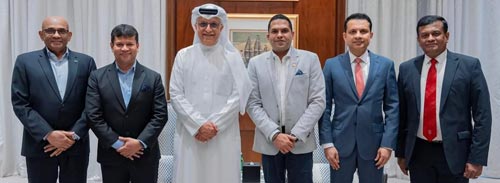Globe-trotting officials done little to get football back on track

FFSL chief Jaswar Umar and Sports Minister Harin Fernando met AFC President Shiekh Salman Bin Ibrahim in Qatar earlier this week
Despite being elected over four months ago, the current football administration led by Jaswar Umar has failed to articulate a clear vision for governing the once defunct sport, according to insiders. The most affected by this four-month period of inaction are the players, clubs, coaches, and officials, as reported by officials of certain leading clubs.
Umar and his present office bearers of FFSL were elected while Sri Lanka was serving a global ban imposed by FIFA, the world governing body of football. However, four months have passed since then, and the FFSL administration has shown no progress, at least in terms of outlining their plans for the ongoing calendar year, let alone the entire elected term.
The football administrators have also failed to appoint important sub-committees, which are customarily appointed to handle responsibilities as per the selected subject, in accordance with their own constitution. This delay has caused many obstructions as the top administrators have shown very little interest in reviving and rebuilding what is called the ‘poor man’s sport’ in Sri Lanka.
It is reliably learned that a cold war has been ongoing within since the election of the present FFSL office bearers, mainly due to the delay in appointing sub-committees, numbering a minimum of seven, which should cover vital areas of football locally. These committees are meant to cover areas of finances, administration, discipline, competitions, legal, media, and other areas crucial for the sport’s development and growth within the country.
However, without a proper guideline and way forward, many leading clubs have become defunct, with Sri Lanka’s top domestic tournaments showing less interest against the administrative challenges that have occurred in recent years. These unsettled battles have brought the entire domestic competitions, including women’s and junior, development programmes, and international assignments, to a standstill.
The President, along with two vice-presidents, Ranjith Rodrigo and Manil Fernando, have been attending various functions organised by FIFA and AFC. Not long ago, Umar was allegedly accused of embezzling FFSL funds by Rodrigo and Fernando. However, the foes have now joined hands to ‘develop’ the sport, which has fallen to the lowest point.
With the absence of leading domestic competitions in the past couple of years, as well as in the ongoing year, most top football clubs have reluctantly decided to disband their elite teams. The main reason for this harsh decision, as stated by the relevant club officials, is the lack of funds to maintain their teams and pay salaries for contracted players, as well as other club expenses.
Two of the most anticipated competitions, the Super League and the FA Cup, have been defunct for many years, leading club owners and officials to reluctantly give up. Additionally, women’s football has been neglected by the FFSL administrators in the recent past, along with the junior and youth competitions.
Among the clubs that have decided to temporarily forego top-level competitions are Blue Star SC, Ratnam FC, Renown FC, New Youngs FC, Red Star SC, and Upcountry Lions, all of which have been leaders in domestic football.
“There’s no sign of competitions being restored or any news of progress about the domestic competitions. Clubs obviously have to spend well within Rs. One to 1.5 million monthly to maintain a team, pay salaries for contracted players, conduct training sessions, and cover other expenses. So we decided to briefly cease our teams,” the club officials revealed upon inquiry by the Sunday Times.
Most clubs have released their foreign contracted players after finding it financially difficult to maintain them, while most players, including locals, have been released to play in other countries, such as Maldives and Bangladesh, with the consent of the clubs.
Some clubs have chosen a different path by establishing junior football academies, with the sole aim of nurturing the future generation of footballers, a responsibility that should fall under the wings of FFSL.
There have been talks about FFSL holding an Emergency General Meeting or Special General Meeting to put the sport back on track while addressing pending matters and tasks. It was supposed to be held prior to the end of 2023, but as of now, there has been no official announcement regarding such a meeting.
The current state of affairs in Sri Lankan football is a cause for concern among players, clubs, and fans alike. The lack of progress and clear direction from the FFSL administration has led to a significant decline in the sport’s infrastructure, domestic competitions, and overall enthusiasm for football in the country.
The failure to address vital areas such as finance, administration, discipline, and media has resulted in a vacuum of leadership that has directly impacted the development and growth of football in Sri Lanka. The absence of leading domestic competitions, neglect of women’s and youth football, and the decline of top football clubs have all contributed to a bleak outlook for the sport.
The alleged internal conflicts within the FFSL, coupled with accusations of mismanagement and embezzlement, have further eroded confidence in the current administration. The decision of several leading clubs to disband their elite teams due to financial constraints is a clear indication of the dire situation facing football in the country.
In the absence of a clear roadmap and proactive measures from the FFSL, the future of football in Sri Lanka remains uncertain. It is imperative for the football administrators to urgently address these pressing issues, restore confidence, and reinvigorate the sport at all levels. The revival of domestic competitions, the nurturing of young talent, and the establishment of robust football academies should be at the forefront of the FFSL’s agenda to ensure a sustainable future for football in Sri Lanka.


